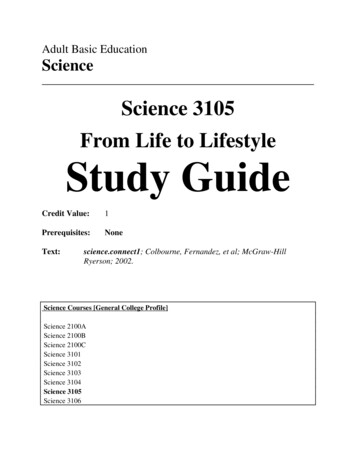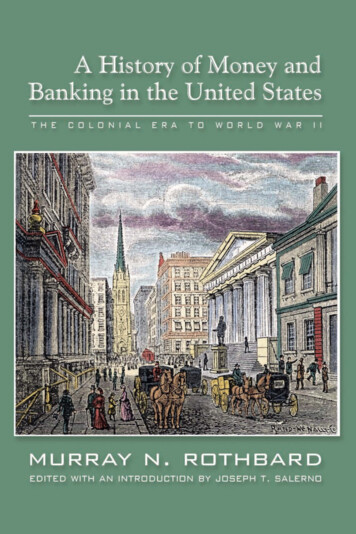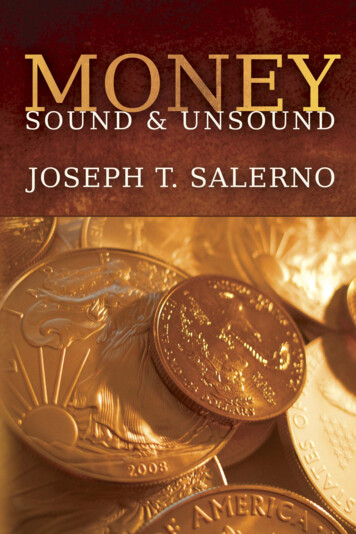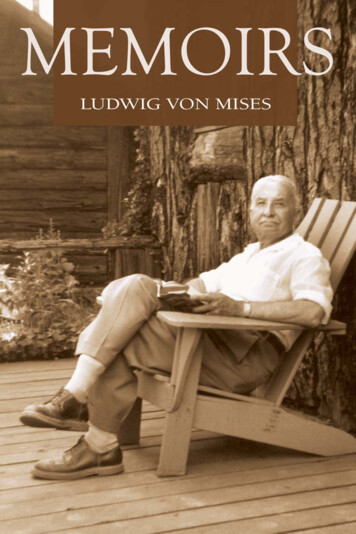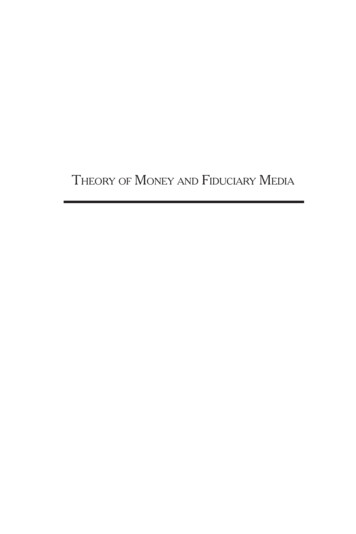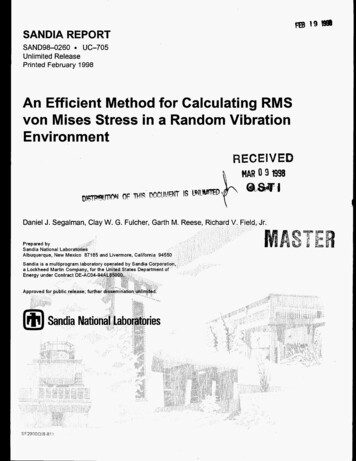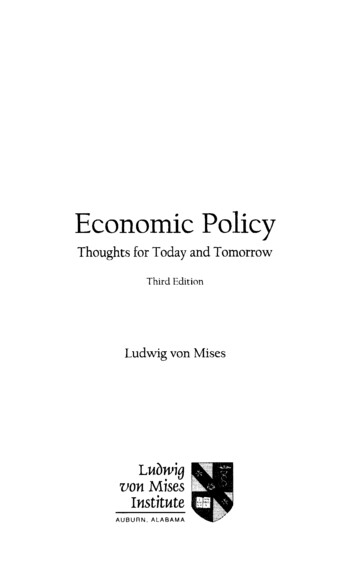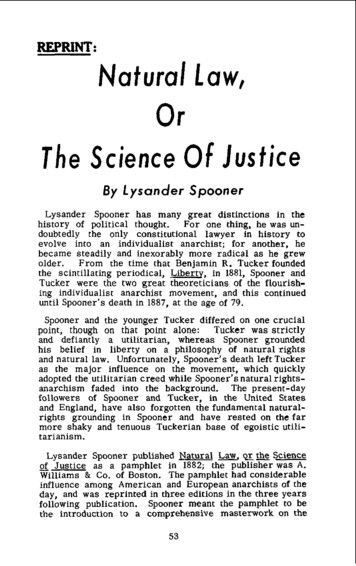
Transcription
REPRINT:N a t u r a l Law,The Science Of JusticeBy L ysander SpoonerLysander Spooner has many great distinctions in thehistory of political thought. For one thing, he was undoubtedly the only constitutional lawyer in history toevolve into an individualist anarchist; for another, hebecame steadily and inexorably more radical a s he grewolder. From the time that Benjamin R. Tucker foundedthe scintillating periodical,in 1881, Spooner andTucker were the two great theoreticians of the flourishing individualist anarchist movement, and this continueduntil Spooner's death in 1887, at the age of 79.m,Spooner and the younger Tucker differed on one crucialpoint, though on that point alone: Tucker was strictlyand defiantly a utilitarian, whereas Spooner groundedhis belief in liberty on a philosophy of natural rightsand natural law. Unfortunately, Spooner's death left Tuckeras the major influence on the movement, which quicklyadopted the utilitarian creed while Spooner's natural rightsanarchism faded into the background. The present-dayfollowers of Spooner and Tucker, in the United Statesand England, have also forgotten the fundamental naturalrights grounding in Spooner and have rested on the f a rmore shaky and tenuous Tuckerian base of egoistic utilitarianism.Lysander Spooner published !&taLaw. o r the ScienceofJusticeasapamphletin1882;thepublisher was A.Williams & Co. of Boston. The pamphlet had considerableinfluence among American and European anarchists of theday, and was reprinted in three editions in the three yearsfollowing publication. Spooner meant the pamphlet to bethe introduction to a comprehensive masterwork on the
natural law of liberty, a n d i t i s a g r e a t tragedy of the historyof political thought that Spooner never lived to completethe projected treatise. But what we have retains enduringvalue from the fact that, of a l l the host of Lo.ckean naturalrights theorists, Lysander Spooner was the onIy one topush the theory to its logical--and infinitely radical-conclusion: individualist anarchism.Those who a r e interest in delving f u r t h e r into Spooner'sexhilirating writings will be greatly rewarded by readinghis & Treason. and his. Letter to Thomas F. Bavard,published together under the titleTreason by t h e PineT r e e P r e s s , Box 158, Larkspur, Colorado, and availablef o r 1.50.The following i s the complete and unabridged pamphletby Spooner; his characteristic subtitle to the pamphletwas: A Treatise on Natural Law, Natural Justice, NaturalRights, Natural . -Land Natural Society; Showine. ThatAll Legislation Whatsoever %1Absurdity, a U s u r a t i o n ,a Crime. Spooner also appended anothercharacterisricnote that: "The Author r e s e r v e s his copyright in thispamphlet, believing that, on principles of natural law, authorsand inventors have a right of perpetual property in theirideas."-THE SCIENCE OF JUSTICEThe science of mine and thine - the science of justice- isthe science of all human rights; of all a man's rightsof person and property; of all his rights to life, liberty,and the pursuit of happiness.It i s the science which alone can tell any man what hecan, and cannot, do; what he can, and cannot have; whath e can, and cannot, say, without infringing the rights ofany other person.It i s the science of peace; and the only science of 'peace;since it i s the science which alone can tell us on whatconditions mankind can live in peace, o r ought to live inpeace, with. each other.
These conditions a r e simply these: viz., first, that eachman shall do, towards every other, all that justice requireshim to do; as, f o r example, that he shall pay his debts.that he shall return borrowed o r stolen property to itsowner, and that he shall make reparation f o r any injuryhe may have done to the person o r property of another.The second condition is, that each man shall abstainfrom doing to another, anything which justice forbids himto do; as, f o r example, that heshall abstain from committingtheft, robbery, arson, murder, o r any other crime againstthe person o r property of another.So long a s these conditions a r e fulfilled, men a r e atpeace, and ought to remain at peace, with each other.But when either of these conditions is violated, men a r eat war.And they must necessarily remain at war untiljustice is re-established.Through all time, s o f a r a s history informs us, wherevermankind have attempted to live in peace with each other,both the natural instincts, and the collective wisdom ofthe human race, have acknowledged and prescribed, a san indispensable condition, obedience to this one onlyuniversal obligation: viz., that each should live honestlytowards every other.The ancient maxim makes the sum of a man's legalduty to his fellow men to be simply this: ''3live honestly,to hurt no m e , @ give t o every 02h&e."--This entire maxim i s really expressed in the singlewords, to live honestly; since to live honestly is to hurtno one, and give to every one his due.11.Man, no doubt, owes many other m o r a l duties to hisfellow men; such a s to feed the hungry, clothe the naked,shelter the homeless, c a r e f o r the sick, protect the defenseless, assist the weak, and enlighten the ignorant.But these a r e simply 1duties, of which each manmust be his own judge, in each particular case, a s towhether, and how, and how f a r , he can, o r will, performthem.But of his M 1 duty- that is, of his duty to livehonestly towards his fellow men- his fellow men not onlym n judge, but, for their own protection, must judge.And, if need be, they may rightfully compel him to performit. They may do this, actingsingly.or in concert. They may
do i t on the instant, a s the necessity a r i s e s , o r deliberatelyand systematically, if they p r e f e r to do so, and the exigencywill admit of it.111.Although i t i s the right of anybody' and everybody -ofany one man, o r s e t of men, no l e s s than. another- tor e p e l injustice, and compel justice, f o r themselves, andf o r . all who may be wronged, yet to avoid the e r r o r s thata r e liable to r e s u l t f r o m haste and passion, and thatevervbodv. who d e s i r e s it, may r e s t s e c u r e in the a s s u r a n c eof protection, without a r e s o r t to f o r c e , it i s evidentlydesirable that men should associate, s o f a r a s they f r e e l yand voluntarily can do so, f o r the maintenance of justiceamong themselves, and f o r mutual protection against otherwrongdoers.It is also in the highest degree d e s i r a b l ethat they should a g r e e upon s o m e plan o r s y s t e m of judicialproceedings, which, in the t r i a l of causes, should s e c u r ecaution, deliberation, thorough investigation, and, a s f a ra s possible, freedom f r o m every influence but the s i m p l ed e s i r e to do justice.Yet such associations can be rightful and desirable onlyin s o f a r a s they a r e purely voluntary. No man canrightfully b e coerced into joining one, o r supporting one,against h i s will. His own interest, h i s own judgement, andh i s own conscience alone must determine whether he willjoin this association, o r that; o r whether h e w i l l join any.If h e chooses to depend, f o r theprotectionof h i s own rights,solely upon himself, and upon such voluntary assistancea s other persons may freely offer to him when the necessityf o r i t a r i s e s , he h a s a perfect right to do so. And thisc o u r s e would be a 'reasonably safe one f o r him to follow,s o long a s he himself shouldmainfest theordinary r e a d i n e s sof mankind, in like cases, to go to the assistance and defenseof injured persons; and should also himself "live honestly,h u r t no one, and give t o every one his due." F o r such aman i s reasonably s u r e of always having friends anddefenders enough in c a s e of need, whether he shall havejoined any association, o r not.Certainly no man can rightfully be required to join,o r support, an association whose protection he does notdesire.Nor can any man be reasonably o r rightfullyexpected to join, o r support, any association whose plans,o r method of proceeding, he does not approve, a s likelyto accomplish i t s professed purpose of maintaining justice,and at the s a m e t i m e itself avoid doing injustice. To join,o r su'pport, one that would, in his opinion, be inefficient,1
would be absurd.To join o r support one that, in hisopinion, would itself do injustice, would he criminal. Hemust, therefore, be left at the s a m e liberty to join, o r notto join, an association f o r this purpose, a s f o r any other,according a s his own interest, discretion, o r conscienceshall dictate.An association f o r mutual protection against injusticei s like an association f o r mutual protection against f i r eo r shipwreck. And there is no more right o r reason inc o m e l l i n g any man to join o r support one of these associations, against his will, his judgment, o r his conscience,than there is in compelling him to join o r support anyother, whose benefits (if it offer any) he does not want.o r whose purposes o r methods he does not approve.No ohjection can he made to these voluntary associations upon the ground that they would lack that knowledgeof justice, a s a science, which would he necessary toenable them to maintain justice, and themselves avoiddoing injustice. Honesty, justice, natural law, is usuallya very plain and simple matter, easily understood bycommon minds. Those who desire to know what it is, inany particular case, seldom have to go f a r to find it.It i s true, it must be learned, like any other science. Butit i s also true that it i s very easily learned. Althougha s illimitable in its applications a s the infinite relationsand dealings of men with each other, it is, nevertheless,made up of a few simple elementary principles, of thetruth and justice of which every ordinary mind has analmost intuitive perception. And almost all men havethe same perceptions of what constitutes justice, o r ofwhat justice requires, when they understand alike thefacts from which their inferences a r e to he drawn.Men living in contact with each other, and having intercourse together, cannot avoid learning natural law, to avery great extent, even if they would. The dealing of menwith men, their separate possessions and their individualwants, and the disposition of every man to demand, andinsist upon, whatever he believes to he his due, and toresent and r e s i s t all invasions of what he believes to he hisrights, a r e continually forcing upon their minds the questions,Is this act just? o r is it unjust? 1s this thing mine? o ris it his? And these a r e questions of natural law; questions
which, in regard to the great mass of cases, a r e answeredalike by the human mind everywhere.*Children learn the fundamental principles of naturallaw at a very early age. Thus they very early understandthat one child must not, without just cause, strike, o rotherwise hurt, another; that one child must not assumeany a r b i t r a r y control o r domination over another; that onechild must not, either by force, deceit, o r stealth, obtainpossession of anything that belongs to another; that ifone child commits any of these wrongs against another.it i s not only the right of the injured child to resist, and,if 'need be, punish the wrongdoer, and compel him tomake reparation, but that it is also the right, and themoral duty, of all other children, and all other persons,to assist the injured party in defending his rights, andredressing his wrongs. These a r e fundamental principlesof natural law, which govern the most important transactionsof man with man. Yet children learn them e a r l i e r thanthey learn that three and three a r e six, o r five and fiveten.Their childish plays, even, could n o t be carried onwithout a constant kegard to them; and it i s equally impossible for persons of any age to live together in peaceon any other conditions.It would be no extravagance to say that, in most cases,if not in all, mankind at large, young and old, learn thisnatural law long before they have learned the meaningsof the words by which we describe it. In truth, it wouldbe impossible to make them understand the r e a l meaningsof the words, if they did not f i r s t understand the nature ofthe thing itself. To make them understand the meaningsof the words justice and injustice, before knowing the natureof the things themselves, would be to make them understandthe meanings of the words heat and cold,wet and dry,light and darkness, white and black, one and two, before*Sir William Jones, an English judge in India, and oneof the most learned judges that ever lived, learnedin Asiatic a s well a s European law, says: "It i s pleasingto remark the similarity, o r rather, the identity, ofthose conclusions which pure, unbiassed reason,,dland nations, seldom fails to draw, in such juridicalinquiries a s a r e not fettered and imanacled by positiveinstitutions." -Jones on Bailments, 133He means here to say that, when no law has been madein violation of justice, judicial tribunals, "in all agesand nations," have "seldom" failed to agree a s to whatjustice is.
knowing the nature of the things themselves. Men necessarilymust know sentiments and ideas, no Less than materialthings, before they can know the meanings of the wordsby which we describe them.If justice be not a natural principle, it is no principle atall. If it be not a natural principle, there i s no such thinga s justice.If it be not a natural principle, all that menhave ever said o r written about it, from time immemorial,has been said and written about thatwhichhad no existence.If it be not a natural principle, all the appeals f o r justicethat have ever been heard, and all the struggles f o r justicethat have ever been witnessed, have been appeals andstruggles f o r amerefantasy, avagary of the imagination, andnot f o r a reality.If justice be not a natural principle, then there i s nosuch thing a s injustice; and all the crimes of which theworld has been the scene, have been no crimes at all;but only simple events, like the falling of the rain, o r thesetting of the sun: events of which the victims had nomore reason to complain than they had to complain ofthe running of the streams, o r the growth of vegetation.If justice be not a natural principle, governments (socalled) have no more right o r reason to take cognizanceof it, o r to pretend o r profess to take cognizance of it,than they have to take cognizance, o r to pretend o r professto take cognizance, of any other nonentity; and all theirprofessions of establishing justice, o r of maintainingjustice, o r of regarding justice, a r e simply the m e r egibberish of fools, o r the frauds of imposters.But if justice be a natural principle, then it i s necessarilyan immutable one; and can no more be changed-by anypower inferior to that which established it-than can thelaw of gravitation, the laws of light, the principles ofmathematics, o r any other natural law o r principle whatever; and all attempts o r assumptions, on the part of anyman o r body of men-whether calling themselves governments, o r by any other name - to s e t up their own commands,wills, pleasure, o r discretion, in the place of justice,a s a rule of conduct for any human being, a r e a s muchan absurdity, an usurpation, and a tyranny, a s would betheir attempts to s e t up their own commands, wills,pleasure, o r discretion in the place of any and all thephysical, mental, and moral laws of the universe.
VI.If there be any s u c h p r i n c i p l e a s justice, it is, of necessity,a natural principle; and, a s such, i t is a m a t t e r of science,to be learned and applied like any other science. Andto talk of either adding to, o r taking from, it, by legislation, is just as false, absurd, and ridiculous a s i t wouldbe to talk of adding to, o r taking from, mathematics,chemistry, o r any other science, by legislation.VII.If there be in nature such a principle as justice, nothingcan b e added to, o r taken from, i t s s u p r e m e authorityby a l l the legislation of which the e n t i r e human race uniteda r e capable.And all the attempts of the human race,or of any portion of it, to add to, o r take from, the s u p r e m eauthority of justice, in any case whatever, is of no m o r eobligation upon any single human being than is the idlewind.VIII.If there be such a principle a s justice, o r natural law,i t is the principle, or law, that tells u s what r i g h t s w e r egiven to e v e r y human being at h i s birth; what rights are,therefore, inherent in him a s a human being, n e c e s s a r i l yr e m a i n with him during life; and, however capable of beingtrampled upon, a r e incapable o f being blotted out, extinguished, annihilated, o r separated or eliminated f r o mh i s nature a s a human being, o r deprived of their inherentauthority o r obligation.On the other hand, if there be no such principle a s justice, o r natural law, then e v e r y human being c a m e intothe world utterly destitute of rights; and coming into theworld destitute of rights, he m u s t necessarily f o r e v e rr e m a i n so. F o r if no one brings any rights with him intothe world, clearly no one can e v e r have any rights ofhis own, o r give any to another.And the consequencewould be that mankind could never have any rights; andf o r them to talk of any such things a s t h e i r rights, would bet o talk of things that never had, never will have, andnever can have existence.IX.If there be such a natural principle a s justice, i t i snecessarily the highest, and consequently the only and601 .-,. . .
universal, law f o r all those matters to which i t is naturallyapplicable.And, of consequently, all human legislationi s simply and always an assumption of authority anddominion, where no right of authority o r dominion exists.It is, therefore, simply and always an intrusion, an absurdity, an usurpation, and a crime.On the other hand, if there be no such natural principlea s justice, there can be no such thing a s injustice. Ifthere be no such natural principle a s honesty, there canbe no such thing a s dishonesty; and no possible act ofeither force o r fraud, committed by one man against theperson o r property of another, can be said to be unjust o rdishonest; o r be complained of, o r prohibited, o r punisheda s such. In short, if there be no such principle a s justice,there can be no such acts a s crimes; and all the professions of governments, s o called, that they exist, eitherin whole o r in part, f o r the punishment o r prevention ofcrimes, a r e professions that they exist for the punishmento r prevention of what never existed, nor ever can exist.Such professions a r e therefore confessions that, s o f a ra s crimes a r e concerned, governments have no occasionto exist; that there is nothing f o r them to do, and thatthere is nothing that they can do. They a r e confessionsthat the governments exist f o r the punishment and prevention of acts that are, in their nature, simple impossibilities.X.If there be in nature such a principle a s justice, sucha principle a s honesty, such principles a s we describeby the words mine and thine, such principles a s men'snatural rights of person and property, then we have animmutable and universal law; a law that we can learn,a s we learn any other science; a law that is paramount to,and excludes, every thing that conflicts with it; a lawthat tells us what i s just and what i s unjust, what i s honestand what is dishonest, what things a r e mine and whatthings a r e thine, what a r e my rights of person and propertyand what a r e your rights of person and property, and whereis the boundary between each and all of my rights of personand property. And this law is the paramount law, and thesame law, over all the world, at all times, and f o r allpeoples: and will he the same paramount and only law, atall times, and f o r all peoples, s o long a s man shall liveupon the earth.
But if, on the other hand, t h e r e be in nature no suchprinciple a s justice, no such principle as honesty, nosuch principle a s men's natural rights of person andproperty, then all such words a s justice and injustice,honesty and dishonesty, all such words a s mine and thine,all words that signify that one thing i s one man's propertyand that another thing is another man's property, allwords that a r e used to describe men's natural rights ofperson o r property, all such words as a r e used to d e s c r i b einjuries and c r i m e s , should b e s t r u c k out of all humanlanguages a s having no meanings; and it should b e declared, a t once and forever, that the g r e a t e s t f o r c e andthe g r e a t e s t frauds, f o r the time heing, a r e the s u p r e m eand only laws f o r governing the relations of men witheach other; and that, f r o m henceforth, a l l p e r s o n s andcombinations of p e r s o n s - those that c a l l themselves governments, a s well a s all o t h e r s - a r e to b e left f r e e to p r a c t i c eupon each other a l l the force, and a11 the fraud, of which theya r e capable.XI.If t h e r e be no such science a s justice, t h e r e can be noscience of government; and all the rapacity and violence,by which, in all ages and nations, a few confederatedvillains have obtained the m a s t e r y o v e r the r e s t of mankind, reduced them to poverty and slavery, and establishedwhat they called governments to keep them in subjection,have been a s legitimate examples of government a s anythat the world i s e v e r to see.XII.If there be in nature such a principle a s justice, i t i snecessarily the only political principle there e v e r was,or e v e r will he. All t h e o t h e r so-called political principles,which men a r e in the habit of inventing, a r e not principlesat all. They a r e either the m e r e conceits of simpletons,who imagine they have discovered something better thantruth, and justice, and universal law; o r they a r e m e r edevices and pretenses, to which selfish and knavish menr e s o r t a s means to get fame, and power, and money.XIII.If there be, in nature, no such principle as justice, t h e r ei s no m o r a l standard, and never can be any m o r a l standard,by which any controversy whatever, between two o r m o r ehuman beings, c a n be settled in a manner to be obligatoryupon either; and the inevitable doom of the human r a c e
must consequently be to be f o r e v e r a t war; f o r e v e r strivingto plunder, enslave, and m u r d e r each other; with no instrumentalities but fraud and f o r c e to end the conflict.XIV.If there be no such obligation a s justice, t h e r e c a n certainly be no other m o r a l obligation- truth, mercy, n o rany ocher-resting upon mankind. To deny the obligationof justice is, therefore, to deny the existence of anym o r a l obligation whatever among men, in their relationsto each other.XV.If t h e r e be no such principle as justice, the world isa m e r e abyss of m o r a l darkness; with no sun, no light, nor u l e of duty, to guide men in t h e i r conduct towards eachother. In short, if there be, in nature, no such principleas justice, man h a s no m o r a l nature; and, consequently, canhave no m o r a l duty whatever.NATURAL LAW CONTRASTED WITH LEGISLATIONI.Natural law, natural justice, being a principle that isnaturally applicable and adequate to the rightful settlement of every possible controversy that can a r i s e amongmen; being, too, the only standard by which any controversywhatever, between man and man, c a n be rightfully settled;being a principle whose protection every man demands f o rhimself, whether h e is willing to accord i t to others, o rnot; being also an immutable principle, one that i s alwaysand everywhere the same, in a l l a g e s and nations; beingself-evidently necessary in all t i m e s and places; being s oentirely impartial and equitable towards all; s o indispensable to the peace of mankind everywhere; s o vital to thesafety and welfare of every human being; being, too, soeasily learned, so generally known, a n d s o e a s i l y maintainedby such voluntary associations a s allhonest mencan readilyand rightfully f o r m f o r that purpose- being such a principlea s this, these questions arise, viz.: Why is it that i t doesnot universally, o r well nigh universally, prevail? Whyi s it that it h a s not, a g e s ago, been established throughoutthe world a s the one only law that any man, o r a l l men,could rightfully be compelled to obey? Why is it that any
human heing e v e r conceived that anything s o self-evidentlysuperfluous, false, absurd, and atrocious a s all legislation necessarily must be, could be of any use to mankind,or have any place in human affairs?The answer is, that through all historic times, whereverany people have advanced beyond the savage state, and havelearned to increase their means of subsistence by thecultivation of the soil, a g r e a t e r o r l e s s number of themhave associated and organized themselves as robbers, toplunder and enslave all others, who had either accumulatedany property that could be seized, o r had shown, by theirlabor, that they could be made to contribute to the supporto r pleasure of those who should enslave them. h e s ebands of robbers, small in number a t first, haveincreased their power by uniting with each other, inventingwarlike weapons, disciplining themselves, and perfectingtheir organizations a s military forces, and dividing theirplunder (including their captives) among themselves, eitherin such proportions a s have been previously agreed on,o r in such a s their leaders (always desirous to increasethe number of their followers) should prescribe.The success of these bands of robbers was an easythmg, f o r the reason that those whom they plundered andenslaved were comparatively defenseless; heing scatteredthinly over the country; engaged wholly in trying, by rudeimplements and heavy labor, to extort a suhsistence f r o mthe soil; having no weapons of war, other than sticksand stones; having no military discipline o r organization,and no means of concentrating their forces, o r acting inconcert, when suddenly attacked.Under these circumstances, the only alternative left them for saving eventheir lives, o r the lives of their families, was to yieldup not only the c r o p s they had gathered, and the landsthey had cultivated, but themselves and their familiesalso a s slaves.Thenceforth their fate was, a s slaves, to cultivatef o r others the lands they had before cultivated f o r themselves.Being driven constantly to their labor, wealthslowly increased; hut all went into the hands of theirtyrants.These tyrants, living solely on plunder, and on the lahorof their slaves, and applying all their energies to the
selzure of still more plunder, and the enslavement ofstill other defenseless persons; increasing, too, theirnumbers, perfecting their organizations, and multiplyingtheir weapons of war, they extend their conquests until.in order to hold what they have already got, it becomesnecessary f o r them to act systematically, and co-operatewith each other in holding their slaves in subjection. u at ll this they can do only by establishing what theycall a government, and making what they call laws.All the great governments of the world- those now existing,a s well a s those that have passed away- have been of thischaracter.They have been m e r e bands of robbers, whohave associated f o r purposes of plunder, conquest, and theenslavement of their fellow men. And their laws, a s theyhave called them, have been only such agreements a s theyhave found it necessary to enter into, in order to maintaintheir organizations, and act together in plundering andenslaving others, and in securing to each his agreed s h a r eof the spoils.A l l these laws have had no more r e a l obligation thanhave the agreements which brigands, bandits, and piratesfind it necessary to enter into with each other, f o r themore successful accomplishment of their crimes, and themore peaceable division of their spoils.Thus substantially all the legislation of the world hashad its origin in the desires of one class of persons toplunder and enslave others, and hold them a s prooerty.111.In process of time, the robber, o r slave-holding, classwho had seized all the lands, and held all the means ofcreating wealth-began to discover that the easiest modeof managing their slaves, and making them profitable, wasnot for each slaveholder to hold his specified number ofslaves, a s he had done before, and a s he would hold s omany cattle, but to give them s o much liberty a s wouldthrow upon themselves (the slaves) the responsibility oftheir own subsistence, and yet compel them to sell theirlabor to the land-holding class their former owners-forjust what the latter might choose to give them.-Of course, these liberated slaves, a s some have erroneouslycalled them, having no lands, o r other property, and nomeans of obtaining an independent subsistence, had no
-alternative - to s a v e themselves f r o m starvation hut tosell their labor to the landholders, in exchange only f o rthe c o a r s e s t n e c e s s a r i e s of life; not always f o r s o mucheven a s that.These liberated slaves, as they w e r e called, w e r e nows c a r c e l y l e s s s l a v e s than they w e r e before. Their m e a n sof subsistence w e r e p e r h a p s even m o r e p r e c a r i o u s thanwhen each had h i s own owner, who had an interest to pres e r v e h i s life. They w e r e liable, a t the c a p r i c e o r interestof the land-holders, to be thrown out of home, employment, and the opportunity of even earning a subsistenceby their lahor. They were, therefore, in l a r g e numbers,driven to the necessity of begging, stealing, or starving;and became, of course, dangerous to the property and quietof t h e i r late m a s t e r
The Science Of Justice By Lysander Spooner . Box 158, Larkspur, Colorado, and available for 1.50. The following is the complete and unabridged pamphlet by Spooner; his characteristic subtitle to the pamphlet was: A . is like an association for mutual protection against fire or shipwreck.





